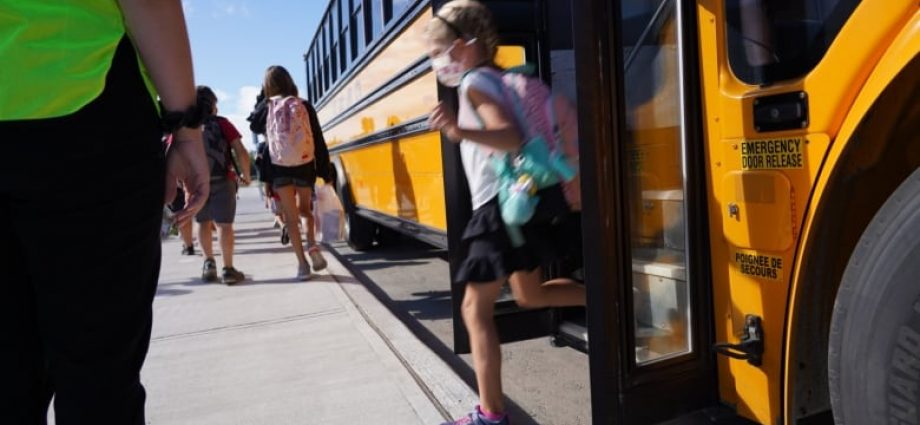
An epidemiologist says the COVID-19 pandemic could have been an opportunity to invest in long-term educational care for Canada’s students, but so far that chance has been “squandered.”
Raywat Deonandan, an epidemiologist and associate professor at the University of Ottawa, said he is “a big fan spending [of] the money now on small class sizes, more educational care, on special attention to special-needs kids in low-income areas.”
“This will pay dividends in the future long beyond when the pandemic is over. We still have time to do these things as a society,” Deonandan said.
He joined The Current’s host Matt Galloway for a national call-in show Monday asking Canadians: How concerned are you about schools reopening amid the COVID-19 pandemic?
Deonandan’s baby is still too young for school, but he said he would be “actually pretty confident that if my child were being sent to an elementary school right now, a public school in Ottawa, that they’ll be kept relatively safe.”
“The challenge is … keeping individuals safe, but the issue isn’t so much individual risk because the prevalence [of COVID-19] is too low. Even if you get the disease, your chances of having a bad experience are still low,” Deonandan said.
Joanne Persel, whose daughter has an intellectual disability and is starting Grade 9 in Toronto, said she is “frustrated” that her child was given the same schedule as all the other high school students in the city.

Some Ontario students return to class on Tuesday. Elementary students and high schoolers will attend school five days a week in standard class sizes. However, secondary students at two dozen boards which are considered higher risk will attend class half the time, and spend the remainder of the week working on online “curriculum-linked independent work.”
Persel says her daughter learns differently from other teenagers and online learning doesn’t work for her.
“She needs one-on-one support. She requires her peers and modelling from her peers. And, while I am absolutely concerned about the virus, I am at this point very concerned about her mental health and social health,” she told Galloway.
“I’m as frustrated as the teachers and principals I know at this point. I have no idea what school will look like.”
Persel said she would tell those in charge of organizing the province’s back-to-school plans that more accommodations are needed for both her daughter and other children with special needs.
Ontario’s education minister Stephen Lecce declined a request from The Current to participate in the call-in event.
“We need smaller classrooms and to get creative,” Persel said.
‘It’s not the Ten Commandments’
Globe and Mail health columnist André Picard said that the Canadian education system “is very set in its ways,” and this has contributed to the lack of creativity and flexibility when coming up with plans to reopen schools.
- Here’s what happens when there are COVID-19 cases in Ontario schools
- School starts in a month, but Canada’s most populous province still doesn’t know what that will look like
“There are all these alternatives that are available to us. We don’t have to have a curriculum that’s carved in stone. It’s not the Ten Commandments. All these things are solvable,” he told Galloway.
“What’s frustrating is that we hear so much: ‘Oh, it can’t be done. It’s impossible,'” he said.
“Nothing’s impossible if we put our minds to it.”
Rylan Higgins, a grandparent in Ketch Harbour, N.S., reiterated Persel’s concerns about a lack of adaptability with many province’s plans.
While Higgins says he’s “not especially worried” about sending his grandchild back to school tomorrow, he is “overwhelmingly disappointed in the complete lack … of problem-solving and creativity applied to this issue.”
Schools ready: N.S. education minister

Nova Scotia Education Minister Zach Churchill said he believes the province’s schools are ready and prepared to reopen.
“We have worked with public health, with children’s hospitals, other PTAs, pediatricians and union representatives to come up with a plan that allows us to get back safely and that allows us to be flexible,” he said.
However, many teachers and their unions don’t agree with that sentiment, with the Nova Scotia Teachers Union saying it believes schools are “in a state of chaos.”
Churchill said that was “obvious hyperbole” and that staff and principals have been back in schools, getting them ready for a number of weeks now.
“I think people feel anxious … and that has happened with every single sector that we’ve reopened. But, you know, anxiety is one thing. The fact is we’re ready,” he told The Current.
Karen Hudson, principal at Auburn Drive High in Halifax, said she is “excited to come back” but acknowledges that many schools face challenges.
“We’re doing the best that we can. You know, [the education ministry has] provided the resources, like training, we’ve got our hand sanitizers there and additional custodian staff to come to help us” she said.
“We have a kind of low caseload in Nova Scotia, the risk is low right now. So it’s a good time to return and as a leader, I’m optimistic and I’m positive.”
reference: https://www.cbc.ca/radio/thecurrent/the-current-for-september-3-2020-1.5709542/pandemic-s-opportunity-to-invest-in-education-has-been-squandered-says-epidemiologist-1.5709547

